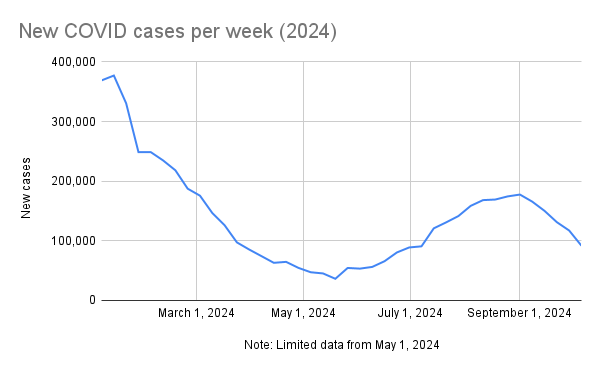Article text below
More than 1,000 new COVID deaths were reported in the U.S. this week, taking the death toll for the past two months to more than 10,000, according to figures collected by BNO News. New cases, however, are dropping nationwide in the aftermath of the summer wave.
At least 91,800 new cases were reported between September 30 and October 6, down from 117,284 the week before (-23%). Those figures were collected from state health departments and, where necessary, estimated based on hospital admissions.
Actual case numbers are higher because many hospitals and states are no longer reporting detailed COVID data. Laboratory testing is also low as most people and doctors are using at-home tests which are not included in official statistics.
“Nationally, COVID-19 activity has continued declining in most areas. COVID-19-associated ED visits and hospitalizations are decreasing overall,” the CDC said in an update on Friday. “ED visits for COVID-19 are highest among infants and older adults. Hospitalizations for COVID-19 are highest among older adults.”
The CDC is also monitoring a new variant, XEC, which is now comprising an estimated 2-13% of new cases in the U.S. The new variant is recombined from two JN.1 lineage viruses, for which vaccines already provide protection. The CDC says there are currently no known impacts on tests, treatments or symptoms.
During the past week, cases increased in only 3 out of 30 states with consistent but limited data. In those states where increases were reported, the changes were only minimal, with longer-term data showing overall declines.
The CDC estimates that COVID cases are currently rising in 0 states (unchanged from last week), declining or likely declining in 45 states (up from 41), and stable or uncertain in 2 states (down from 7). Nationally, COVID test positivity is 11.6%, which is unchanged from last week.
Only 32.8% of hospitals in the U.S. submitted COVID data this week, which is similar to last week. Mandatory reporting is expected to resume next month. Those limited figures reveal that at least 4,187 Americans are currently hospitalized with COVID, down from 4,657 last week.
1,209 new COVID deaths were reported during the week, the eighth week in a row with more than 1,000 new deaths. It’s also the 13th week in a row with more than 500 new deaths and the 237th week with more than 400 new deaths.
So far this year, more than 5.6 million COVID cases have been reported across the U.S., causing at least 381,888 hospitalizations (limited data) and 45,132 deaths, according to BNO’s COVID data tracker.



sigh Remember when people masked up and quarantined, and the number of influenza deaths plummeted as a side effect? Remember when bottles of sanitizer were everywhere and people were actively health-conscious, and the knock on effect was a generally healthier and safer society? Remember Medicaid expansion and pop-up clinics and a national economy suddenly invigorated in pursuit of a comprehensive health solution for the entire population? And under a Republican President no less.
Gone. Gone. Gone. Like dust in the wind.
Given that China was ground zero for the epidemic, they achieved remarkable success. Longest time without a vaccine. Enormous urban populations. A host of hurdles for getting people protected without straight up strangling the economy to death. But they managed a national strategy for containment, treatment, and harm mitigation incredibly well.
Countries like Japan, the Koreas, New Zealand, Vietnam, Nigeria, Indonesia, and Pakistan largely outperformed their peers by delaying the initial onslaught of cases. They closed airports and limited the influx of residents from infected nations. Island nations did fantastic, entirely because of control over international travel. By the time they started to see cases emerge, the disease had mutated to a less-lethal state and enough treatment options were available to mitigate the effects.
Overall, it seems like humanity got out of this fairly well. Compare COVID to the 1917 Flu, for instance. Or the AIDS epidemic, which was far slower to spread but more difficult to treat and prevent. Information on the disease was accrued and distributed rapidly. Scientific investigation quickly nailed down the vectors of spread and yielded useful information on how to avoid contagion, which was (mostly) faithfully propagated internationally. We got a vaccine out in record time, using a totally novel technology that will continue to pay dividends.
This could have gone better. More lives could have been saved. But our performance relative to prior pandemics appears to have improved remarkably.
We are on year 5 of a new pandemic. It is way too early to make any kind of conclusive judgement about how well we "got out of this" because we're still in it and will be for the forseeable future. If at some point, technological advances and economics conspire to meaningfully reduce infection rates to negligibility, we will still be watching the biological consequences of the last 5 years play out for the next several generations.